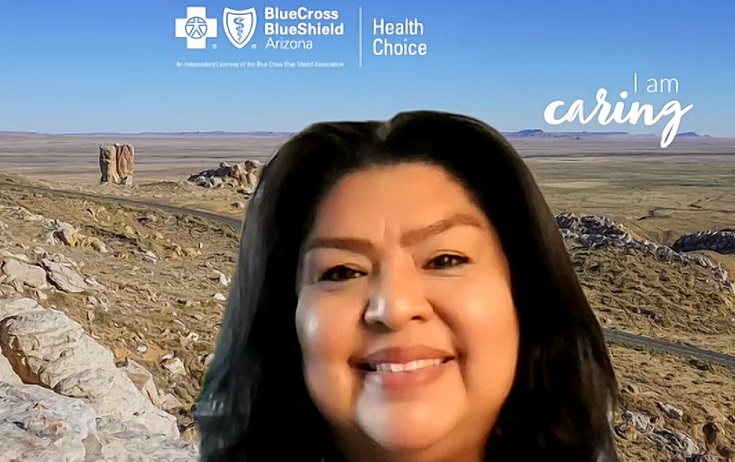When Holly Figueroa accepted the role of president of the Arizona Rural Health Association board of directors in July 2022, she knew the term was only a year, but hoped she could dig deep to make changes that would help the organization’s role in rural health advocacy grow in meaning and in action.
“There was a time of transition, and I didn’t always feel that I'd have the opportunity to really dig deep into what AzRHA would like to accomplish,” Figueroa said.
Halfway through her first year, Figueroa made time to talk about AzRHA and her work as a Tribal Liaison at Blue Cross Blue Shield Arizona Health Choice based in Flagstaff. Figueroa, a member of the Hopi/Ohkay Owingeh Tribe and is from the Sun Clan, said her work as a tribal liaison focuses on 17 tribes in the Health Choice service area focusing on crisis service, coordination of care, nation building, training and education, and reducing health disparities.
The Arizona Telemedicine Program first worked with Figueroa prior to her work as a tribal liaison when her focus was cultural competency, helping health care workers deliver cultural and linguistically appropriate services. In Building Bridges, Connecting Two Worlds, a webinar hosted by the Arizona Telemedicine Program and the Southwest Telehealth Resource Center, Figueroa focused on tribal histories and cultural understanding to provide tips for effective engagement with tribal members and communities.
“I thought I was going to talk about telehealth related to the work I was doing, but really it was an opportunity to build awareness and educate,” Figueroa said. “I’m so thankful for Kris (Erps Stewart, Arizona Telemedicine Program interim director) for asking me. It was a great session, and it opened a lot of other doors to a lot of different platforms in terms of advocacy and education, and awareness.”
Figueroa served on the AzRHA board for five years before becoming president. She describes those as a listening and observing period, and in her new position she finds herself wanting to move AzRHA as an organization that looks at what the rural health gaps and needs are specific to the geography of rural Arizona.
“I want to make sure we are really looking at rural areas across the entire state, and all our communities—our veteran communities, our tribal population, our LGBTQ population. And for me, you know, I'm a doer. If we say we want to advocate, let’s advocate.”
This rural advocate’s to-do list has focused on rebranding the organization with a new logo and fresh website, and growing its membership. However, with no president-elect on the AzRHA board, Figueroa is doing something unusual that no prior AzRHA board president has done before—serve a second term, giving her a chance to do more then she was able to accomplish her first year.
“It's a great opportunity to be involved,” Figueroa said. “I would encourage anyone who's passionate about advocating for their community who wants to be a voice for rural issues to join us.”
Connecting to membership with more than 200 members is a priority for Figueroa.
“We need to engage regularly,” she said, “And we need to be there for our rural hospital and clinics. In our smaller communities there are disparities around health care, connectivity, and transportation. There are food deserts, and aging populations. I'm hopeful that I bring my knowledge of those issues to the organization.”
Figueroa said part of her work and the work of the board is recognizing that they aren’t the only organization in Arizona with rural in their name and that sometimes it feels like there are a lot of similarities. Her personal goal is to help the organization become more action oriented, more visible in communities across the state, and be more collaborative.
“We also again want to make sure that rural Arizona knows that we are here advocating and supporting them in their efforts,” she said.
Recently she was able to introduce representatives from the national State Offices of Rural Health to the Hopi lands—going through the proper channels to bring those reps to the nation.
“It was an opportunity to talk about Arizona’s challenges, and bring up tribal issues. I was blown away and excited to have those conversations. They thought they could do it in a couple of hours, and I said, ‘No, I think we need a whole day.’ I think it's a great opportunity to educate folks that are from a national level what we are experiencing, and what our community members are experiencing in terms of rural health,” Figueroa said.
Coming on as AzRHA board president, working as a tribal liaison with Blue Cross Blue Shield, and working in cultural competency are part of a career and life journey that have sometimes meant that Figueroa has had a hard time saying no. “But I’m thankful for that, and thankful for my family. They supported my work, but I do look forward to passing the baton.”
“For Hopi, our purpose in life is to always serve the community. I'm thankful for my roles and thankful for the things that I've been able to do,” Figueroa said.
“I don't have any plans of stepping back anytime soon. I’ll always want to help, and I’ll always want to collaborate.”
Spotlight: Holly Figueroa on serving tribal nations and rural Arizona

